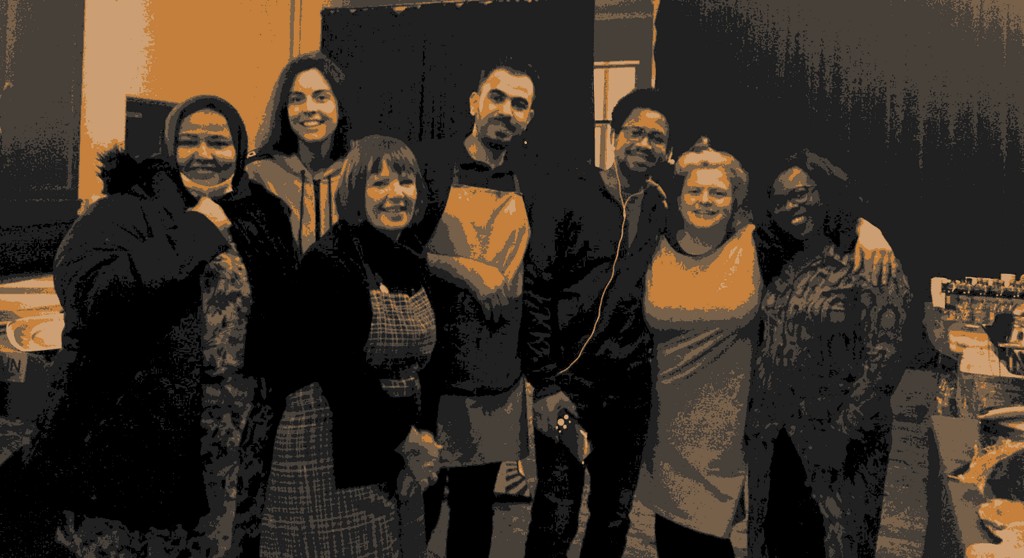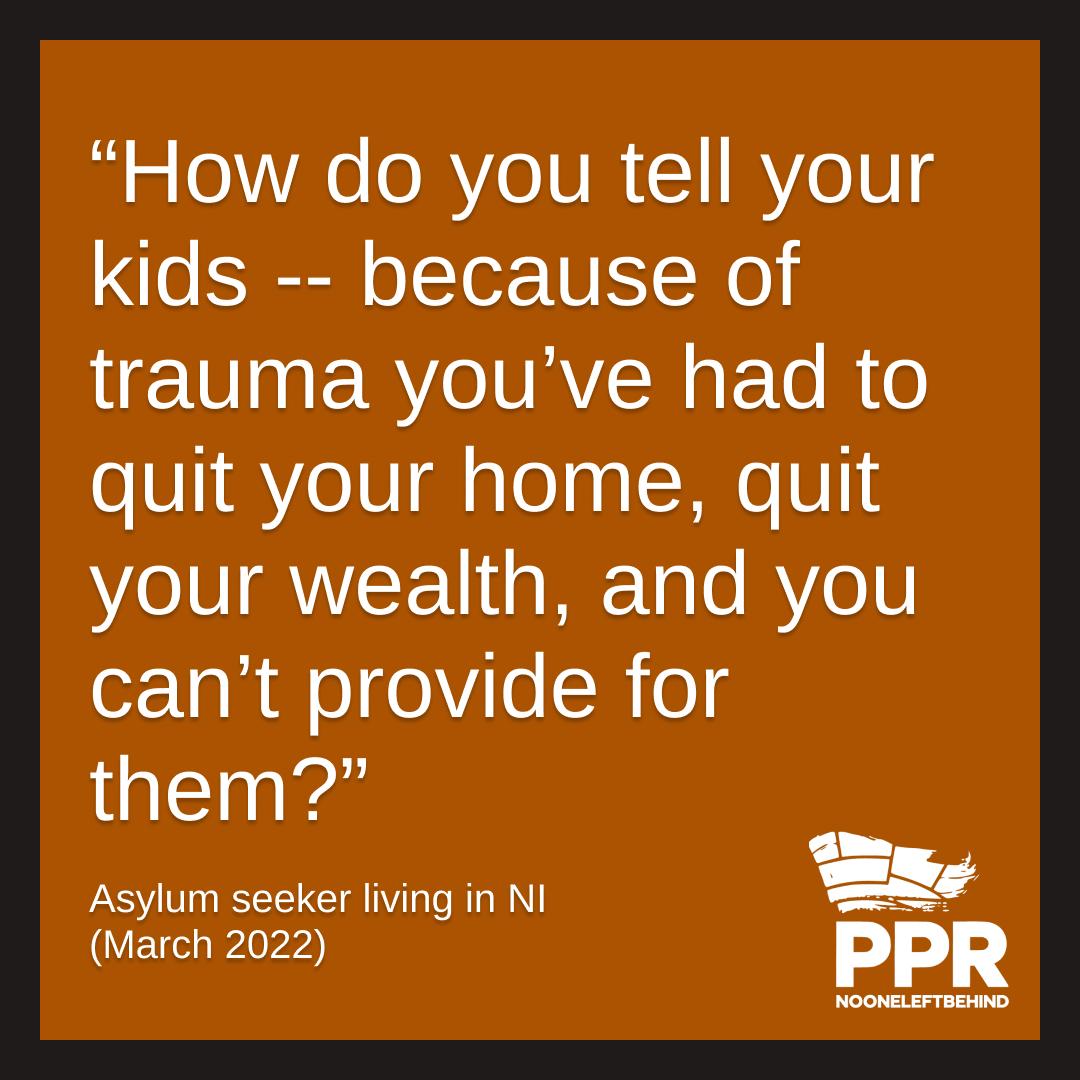Accommodating Harm? The Use of Hotels as 'Contingency Accommodation' (Part Two)
As of start April 2022, there were over 1000 people seeking asylum lodged in 14 hotels across NI. Responsibility lies with the UK Home Office and the private contactor Mears Group
UK government policy acknowledges that hotels are wholly unsuitable for lengthy stays, particularly for families. The Homelessness code of guidance for local authorities, for instance, calls such accommodation “particularly detrimental to the health and development of children” (para. 17.32) and recommends it be used for families in particular “only as a last resort and then only for a maximum of 6 weeks” (para. 17.33).
Damaging for children
Children’s right to develop to their fullest potential is a fundamental right guaranteed in the Convention on the Rights of the Child (article 29), as is their right to enjoyment of the highest attainable standard of health (article 24). The fact that official UK guidance explicitly recognising the detrimental effect of hotel accommodation on these rights is being not just ignored but systematically flouted is a serious breach that cannot be allowed to continue.
Numerous hotel residents highlighted the lack of transparency around the criteria, rules and procedures for moving people on. Some families have reportedly been relocated far faster than others, without explanation, increasing the sense of frustration, powerlessness and distrust amongst those left behind. Some households have refused to move unless they can be assured that it is to stable, permanent, single-family accommodation.
Denial of a school place to a school-age child is clearly harmful to the child’s development and a clear and unacceptable breach of their right to education.
Parents recounted that some children have not been enrolled - or have been enrolled after significant delays – in school. In 9 March 2022 correspondence with PPR Mears referred to ‘Play to Learn’ sessions and visits from the Education Authority. Denial of a school place to a school-age child is clearly harmful to the child’s development and a clear and unacceptable breach of their right to education.
Damaging to health
There appear to be numerous blockages to people’s right to highest attainable standard of health.Children’s health was affected by lack of suitable food; lack of indoor and outdoor play facilities; and in some cases by factors such as insufficiently heated rooms. With regard to people with disabilities, at least one hotel (Camera House) does not have a working lift, yet disabled or mobility-impaired people have been placed there, with serious fire safety and other ramifications. In other places, wheelchair-bound people have been placed in rooms where there is insufficient space for their chair to move properly.
With regard to existing health concerns, some people have not been given access to medicines or supplements to address issues such as iron deficiency. In terms of health care provision, residents reported not having been given health cards or registered with GP services, so that the only available health care, even to address the above concerns, was A&E – surely not the best use of resources. Finally people reported their mental health was impacted by prolonged stay in the hotel settings, given all of the factors highlighted here.
Everyone has a range of recognised cultural rights, which again are inter-related and inter-dependent with human dignity and rights. One of the most difficult issues for hotel residents is culturally inappropriate and inadequate food. Only in one hotel – Camera House in Belfast – are people now given access to the kitchen to cook for themselves. In all other accommodation, set meals are provided three times a day. People are not allowed to cook for themselves; there is no food provided in between meals; and people are not allowed to have food in their rooms. (Some may have access to a kettle, but none have access to a microwave or refrigerator). People with health or dietary issues (such as anaemia, diabetes or dental issues) find the food insufficient. Parents with babies find themselves having to go repeatedly to ask for bottles to be heated in the kitchen, for instance. Those with toddlers or older children find that they do not necessarily like the prepared meals, which may include fried or spicy food; and they naturally are hungry between set meal times. Parents struggle to ensure that their diet is varied enough, given the lack of a supply of readily available fresh fruit and other fresh food. Parents worry that their children’s health and development are being affected.

Damaging to family life, mental health and privacy
Another area of concern is the lack of indoor or outdoor recreational space. This affects everyone but is particularly acute – and potentially developmentally harmful – for children. Hotel residents do not have access to communal areas other than the dining rooms during meal times. Parents report that children are not allowed to play in the corridors, and that there is no safe outdoor play space.
The hotel rooms are generally small, 2-person rooms. For families, this means that parents are split up, each in a different room with one or more children; in some cases, older children are reportedly in rooms on their own. The rooms may or may not be in the same area or on the same floor of the hotel. This is enormously problematic in terms of safeguarding amongst this vulnerable population, some of whom may have suffered trauma before, during or after their flight from their country of origin. It also substantially disrupts people’s ability to enjoy the right to privacy and to a family life.
Damaging to integration
Moreover, hotel life impedes people’s integration with the local community. They are not allowed visitors, and no access to lobby or communal areas outside of mealtimes (and no outdoor communal areas at all) their contact with others is limited.
Respecting people’s dignity means avoiding ‘offers’ that effectively force people to choose to resolve one set of issues by creating another.
With regard to location, decision-making does not appear to be person-centred. We received several different reports of people with significant physical or mental health issues being offered places in one location when the support network on which they rely is in another, for instance. Respecting people’s dignity means avoiding ‘offers’ that effectively force people to choose to resolve one set of issues by creating another.
Families in particular are suffering the effects of insufficient financial support. While asylum seekers in other accommodation receive £40.85 per person per week for food, clothes and toiletries – already a woefully inadequate sum for people denied the right to work to support themselves – those placed in hotels reportedly receive only £8/week. From this they are expected to meet all of their needs – including additional fresh food, toiletries, sundries and in one instance, taxi fare to hospital for a sick child after hotel staff said that they were unable to arrange transport.

What are we asking for? The Kind Economy
People seeking asylum in Northern Ireland are only able to apply for the right to work after they have been waiting for a decision on their asylum claim for over a year. Even then, the few people who are granted such permission are rarely able to work in practice because their employment is restricted to the narrow list of highly skilled professions included on the Government’s Shortage Occupation List. This decision is also left up to the discretion of individual Home Office case workers and the Home Office do not release any figures on how many, if any, are successful in gaining the right to work. This means that people are essentially banned from working whilst they wait months, and often years, for a decision on their asylum claim.
What this means in practice is that people’s skills are wasted – neither they nor their host community get the benefit of their training and abilities, and the wider economy is deprived tax revenue and other proceeds from their work. Denying them the chance to work denies their dignity as a productive person, and makes them dependent on handouts. This has knock-on effects for their mental health and makes them vulnerable to risky work and exploitation.
There is another way. We are asking duty bearers, at a minimum, to immediately
- stop putting FAMILIES with kids, or disabled people, into hotels - if they must be there then respect the UK government’s six week limit
- hotels must be TEMPORARY for everyone - no stays of over three months
- give all residents INFORMATION, with transparency around procedures and timelines
- let people COOK, even in turns. Provide access to fridges and microwaves, allow food in rooms
- send children to SCHOOL
- give people adequate financial SUPPORT
- end PERIOD POVERTY, give toiletries
In addition, over the short, medium and longer term we are asking duty bearers to
- support the KIND ECONOMY
- build HOMES